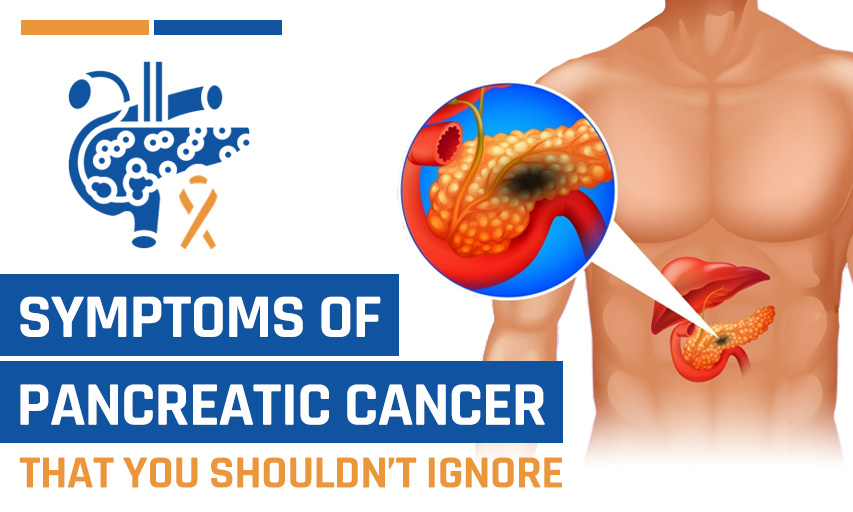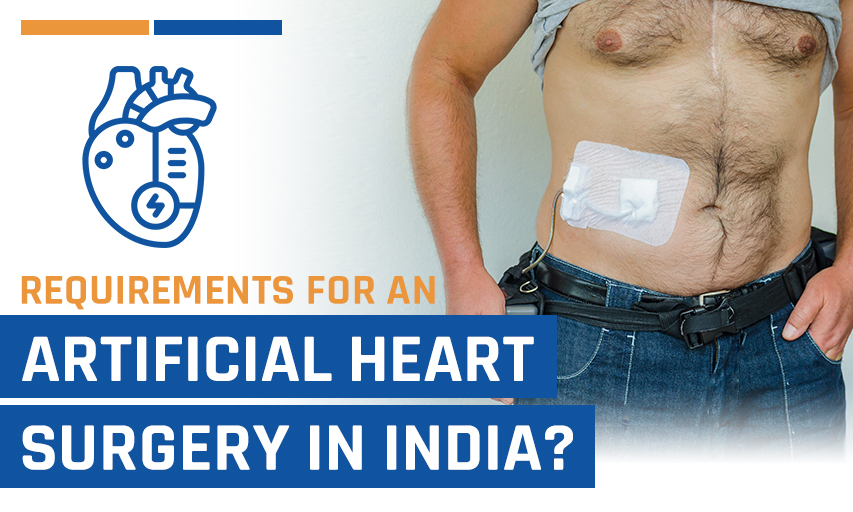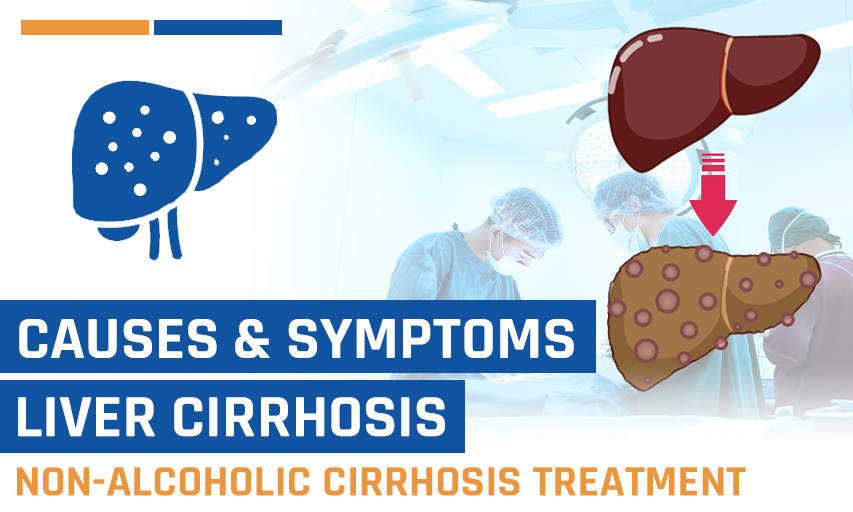4 Warning Signs & Symptoms of Pancreatic Cancer That You Shouldn’t Ignore
Pancreatic cancer can be caused by uncontrolled proliferation of pancreatic cells that have undergone mutation and lead to tissue accumulation. While some masses may be benign, malignant tumours can develop in the pancreas. Malignant tumours grow in the pancreas of people with pancreatic cancer.
In most cases, pancreatic cancer is not discovered until it has progressed to a more fatal stage. Jaundice and fat loss are two very clear symptoms of pancreatic cancer. The two risk factors include diabetes and exposure to certain toxins. The tumour’s location, size, and whether it has spread to other areas of the body are the factors that help in deciding the treatment plan. Continue reading this page to find out everything you need to know about the signs & symptoms of pancreatic cancers and how you can manage and treat them.
What are the Different Types of Pancreatic Cancers?
Pancreatic tumours can be categorised into two main types: exocrine and endocrine tumours, both of which are collectively referred to as pancreatic carcinoma. These types differ in their nature and require different treatments and outlooks for patients. Accurate diagnosis of the tumour type is very important, as it is what influences the success rate of treatment and overall prognosis.
■ Tumours in the neuroendocrine system
Exocrine neoplasms are found to be more common than neuroendocrine tumours, which account for approximately 1-5% of all pancreatic cancer cases. Differentiating between neuroendocrine and exocrine tumours and giving the right diagnosis is important, as these types, symptoms, prognosis, and treatment options all differ. This differentiation decides the right treatment plan for the tumour.
■ Adenocarcinoma of the Pancreas
Adenocarcinoma is the most common type of pancreatic cancer that accounts for about 75% of all pancreatic cases. When people talk of pancreatic cancer, they mean this kind of cancer that arises from the exocrine glands of the pancreas.
■ Cystic Tumours, Including IPMN
Cystic tumours are a subtype of exocrine tumours identified by fluid-filled cavities. While most of these tumours are benign, a small percentage may turn out to be malignant. One example of this is intraductal papillary mucinous neoplasm (IPMN), which requires careful monitoring due to its potential for turning into a fatal cancer.
What Causes Pancreatic Cancer?
Pancreatic cancer is caused by damage to the DNA of pancreatic cells. This disruption causes a single cancer cell to grow and divide uncontrollably. This leads to the formation of a tumour, which disrupts the normal bodily functions. If left untreated, the cells from the tumour can then invade the bloodstream or lymphatic system and spread cancer to other parts of the body.
While the exact cause behind DNA damage remains unclear, researchers have noticed that mutations are common in the removal of pancreatic tumours. These mutations can vary from one person to another and can decide how complex the case is.
Pancreatic Cancer Symptoms
The symptoms of pancreatic cancer, tumours, and cysts can vary depending on the kind of cancer and its severity. The common symptoms of the cancer are:
■ Diabetes complications - Certain rare pancreatic tumours can affect insulin-producing cells and disrupt the body’s blood sugar levels. This can lead to difficulty in managing blood sugar levels for diabetes-affected people.
■ Digestive Problems - One of the symptoms of this cancer is pancreas problems in the stomach, like discomfort, nausea, and vomiting, especially after eating.
■ Jaundice - Symptoms such as itchy skin, dark urine, pale stools, and jaundice can indicate involvement of the liver. Jaundice, specifically in adults, may suggest liver and pancreatic cancer, particularly in cases of metastatic pancreatic cancer.
■ Unidentified Weight Loss - Unidentified weight loss can result from a reduced appetite or digestive problems with the tumour.
■ Back Pain - As the tumour grows, it may irritate nearby nerves and cause severe pain that radiates from the abdomen to the mid-back.
What Are Some Risk Factors for Pancreatic Cancer?
Risk factors are points that increase a person's likelihood of getting cancer. Most risk factors can affect the development of cancer, but they do not directly cause cancer. People with one or more potential risks may never get cancer, but others who have no exposure to risk factors just might. Why? Because these risk factors directly influence your chances of getting cancer. The more you understand them, the better equipped you'll be to make healthy lifestyle and medical choices in the future. The risk factors include:
- The risk of pancreatic cancer increases with age. Most patients are over 45, with 90% being over 55 and 70% over 65. While it can occur at any age, it is rarely seen in children.
- Obesity, overeating, and excessive drinking are contributing factors for this cancer. Daily consumption of high-fat meals raises one's chance of developing pancreatic cancer. Many studies have shown a correlation between obesity and a higher likelihood of developing pancreatic cancer. Heavy drinking may also raise one's pancreatic cancer risk because of its linkage to pancreatitis.
- Family history is another contributing factor. Genetic disorders with high cancer risk can increase the chance of pancreatic cancer in a person.
- Research shows that pancreatic cancer is more likely to occur in people who have been suffering from diabetes for a long period of time. The sudden onset of diabetes in the later part of life might be known to indicate this cancer and is given the name of new-onset diabetes. Not everyone with diabetes develops pancreatic cancer, though.
- Smokers are three times more likely to develop pancreatic cancer compared to non-smokers, making smoking a major risk factor.
How to Detect Pancreatic Cancer?
Pancreatic cancer screening is usually only done for people with a high risk of developing the disease. For people with fewer risks and initial-stage pancreatic cancer, genetic testing is usually recommended. The reason being an incidence of the illness in the patient's family. There are two common procedures to check for early signs of pancreatic cancer in people with high risk:
- Endoscopic ultrasound
- MRI scan
These approaches are advised to be only used for people with a high risk of developing pancreatic cancer. You may also benefit from speaking with a doctor or genetic counsellor to learn about your pancreatic cancer chances and what you can do to control it.
Diagnosis of Pancreatic Cancer
The diagnosis of pancreatic cancer can be a complex process. Several different kinds of testing are often needed to make an accurate diagnosis of pancreatic cancer. This is the list of specialists that you are likely to have for your pancreatic cancer care team:
- Gastroenterologist; a medical professional specialising in digestive system disorders and their treatment.
- A medical oncologist or a cancer specialist; a clinician who specialises in the diagnosis and monitoring of cancer using immunotherapy, chemotherapy, or surgical intervention.
- Radiation Oncologist; Radiation-therapy cancer specialist.
For the most thorough picture possible, the team may use a combination of blood tests, biopsies, imaging studies, and, in certain cases, molecular testing. This procedure also assists physicians in determining the most effective therapy alternatives.
How Can You Identify Pancreatic Cancer at its Earliest Stages?
There is no pancreatic cancer miracle cure. The cancer requires early detection and prompt treatment. So, identifying it at an advanced stage makes the treatment process difficult. Efforts to develop early detection tools have been made and so far been unsuccessful. A few examples are:
■ Testing of the blood:
Some chemicals, such as CEA and CA 19-9, are higher in persons with pancreatic cancer. Because these levels may not increase until pancreatic cancer is established, if, at all, blood tests may not provide for early identification of pancreatic cancer, these tests may also generate false-positive results.
■ Ultrasound Imaging:
Ultrasound imaging is performed during an endoscopic procedure. In some families, multiple members are affected by pancreatic cancer. Several studies are now examining the effectiveness of intensive screening using endoscopic ultrasonography to detect pancreatic cancer in otherwise healthy family members as an early warning system. Early findings are encouraging, but since endoscopy is an invasive procedure, it should only be used in individuals with a high predisposition to pancreatic cancer.
What Are the Options for Pancreatic Cancer Treatment in India?
Early detection of the symptoms of liver and pancreatic cancer increases pancreatic cancer survival rates. Patients in the latter stages of pancreatic cancer may still benefit from medicines that can help them manage the illness and allow them to live healthier and longer lives. The pancreatic cancer treatment options in India are:
■ Surgery
If you have pancreatic cancer, your doctor may recommend having all or part of your pancreas removed. Typically, the tumour is taken out of a region, and a margin of healthy tissue is extracted along with it. The goal is to ensure no cancer cells are left in the healthy tissue taken from the patient after the pancreatic cancer surgery. This is also referred to as having negative margins.
■ Medication-based treatments
Medication-based treatments aim to destroy cancer cells. This treatment is systematically administered across the body via bloodstream circulation. It is also possible to administer local medicine straight to a specific body area to localise the treatment of the cancer.
■ X-ray treatment
Radiation for pancreatic cancer is another treatment method. Cancer cells can also be destroyed through X-rays or other particles delivered through radiation therapy. Radiation oncologists are doctors who specialise in administering cancer-fighting radiation therapy. When radiation is administered from a device outside the body, it is known as external-beam radiation therapy.
■ Chemotherapy
Chemotherapy for pancreatic cancer is useful in killing cancer cells by stopping them from multiplying and creating new ones via the use of medicines. It is used to cure cancer, reduce the chances of its return, slow down cancer growth, and shrink tumours.
Why Pancreatic Cancer Treatment in India?
Pancreatic cancer is a difficult-to-detect disease that often presents itself late due to its unclear symptoms. This often makes early diagnosis difficult but important for better survival rates. Advanced pancreatic cancer can oftentimes turn out to be fatal and difficult to treat. For early detection and treatment, understanding the cancer's risk factors, types, and treatment options is important. Recognising the warning signs and getting prompt medical care is the best treatment for those affected by this aggressive cancer.
Moreover, to prevent pancreatic cancer, you need to eliminate your risk factors completely. Eating healthily, quitting smoking, and exercising regularly can improve your general health and lessen your chances of getting pancreatic cancer. Furthermore, India is one of the best countries for getting cancer treatments, including pancreatic cancer. Not only will you find the pancreatic treatment in India very affordable, but also of very high quality and done by the leading oncologists at state-of-the-art hospitals.




















Be First To Comment
Leave a Comment